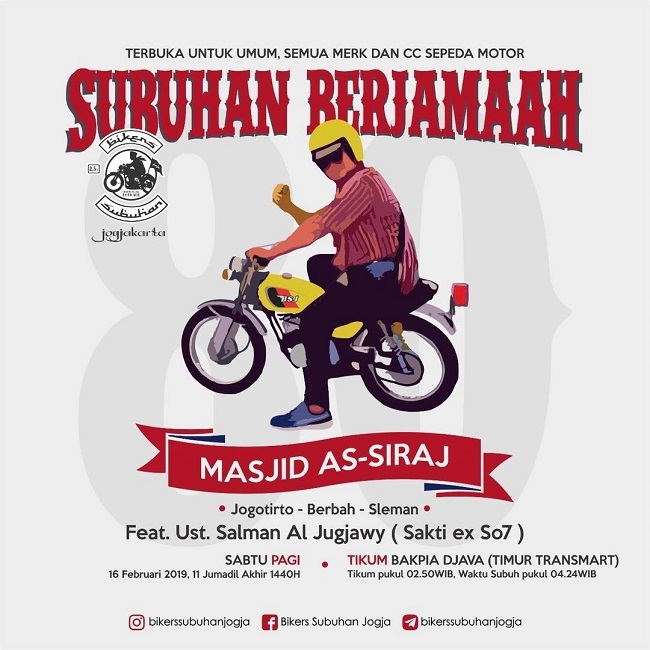Yogyakarta’s Dawn Prayer Bikers are converting an outlaw tradition into a prayer ritual
Wasisto Raharjo Jati
Early risers in Yogyakarta today are treated to a new type of spectacle each Saturday morning. Since 2017, a group of bikers has created a ritual that combines the expression of their faith and their passion for riding. Bikers Subuhan Jogja, or the Jogja Dawn Prayer Bikers, use social media such as WhatsApp and Telegram to arrange a 3am meeting at a mosque – a different one every Saturday – to hold the dawn prayer together.
Such groups are not only found in Yogyakarta. The movement started in 2016 in Lampung, and can also now be found in Bandung and Makassar. It is mostly young, urban professionals who are attracted to this type of pious but edgy outing. Some members regard the Dawn Prayer Bikers as part of a contemporary take on Hijrah (the migration journey of Prophet Muhammad). Members of this movement do not physically migrate, but find inspiration in the metaphor of leaving behind one’s familiar surroundings, as Prophet Muhammad did when migrating from Mecca to Medina.
Pious biking
The main aim of the Dawn Prayer Bikers is to provide an example of pious living by joining together for prayers. At the time of writing, they had held 92 congregational prayers. But they also hold fundraising events for causes such as the pro-Palestine effort, the wellbeing of Muslims suffering in places such as China and New Zealand, and for the victims of natural disasters in Indonesia. They gather funds in a ‘roving prayer cap’ during their rides.

Why do they choose the dawn prayer for their collective worship? According to the Qur’an, Muslims who pray together at dawn in mosques will be granted a high reward from God, and the reward will increase if more travel is involved in reaching the mosque. More generally, bikers regard the ritual as a way to emulate of the conduct of the Prophet.
Tieto Romadhona, the chair and founder of the Yogyakarta Dawn Prayer Bikers expressed it thus:
The positive feedback we receive from other young people becomes like a challenge to our friends to also wake up early to pray together at dawn in mosques. It seems strange, but this is an effective way of changing the character of young people in Yogya, to make them more pious and courteous. They are embarrassed if their friends [but not themselves] get public recognition for being diligent in attending dawn prayer at the mosque.
Consumption and Islamisation
Dawn Prayer Bikers fit into a recent pattern of Islamisation, one manifesting in lifestyle displays. Other examples of this are hijab-wearing groups, Muslim housing estates, Muslim banking and Muslim cinemas. These branded activities are very marketable to young Muslims in cities like Yogyakarta, where many have disposable income that grants them access to such things.
Such branded activities symbolise multiple identities. They replicate forms of Western consumption, but are transformed through being labelled halal (permissible) or Muslim. With this label, distinctively ‘modern’ activities associated with Western lifestyles that are very attractive to young urban Muslims are transformed into a display of Islamic values. As long as they are labelled in accordance with the Qur’an and Islamic tradition, these products and activities can snowball in popularity, being picked up by group after group wishing to be ‘modern’ in a pious way.
The Dawn Prayer Bikers’ clothes illustrate this blending of traditions. They wear classic, Western biker wear, such as uniforms, boots and jackets (although they avoid tattoos and body piercing, which preachers often claim are haram, or prohibited). In that sense, they look like regular bikers. Their devout activities, however, such as visiting mosques and attending preaching, make it clear that their lifestyles are nothing like those traditionally associated with the biker image.
And like many other Indonesian forms of Islamic piety, membership of the group has social value too. Bikers are not only each others’ colleagues in riding and prayer; in joining they also extend their personal networks, both socially and professionally.

Why motorcycles?
The middle-class affluence of the Dawn Prayer Bikers helps one understand how they can make motorcycle-riding their display of piety. For some members, their motorcycle is the focus of their constant attention: they like talking about routes, maintenance and equipment, often. For other members, outings with the Dawn Prayer Bikers is the only occasion they actually ride their motorcycles; at other times, they drive cars. For such members, the pious angle provides a great reason to join in with a group of like-minded, similarly affluent young people.
The Yogyakarta chapter now attracts around 390 bikers. The popularity of the group reflects the flexible piety of contemporary Indonesia. The problem of how to maintain an Islamic identity against a backdrop of concern about westernisation is overcome by cultivating a devout lifestyle through engaging in contemporary forms of consumptive pleasure.
Wasisto Raharjo Jati (wasisto.raharjo.jati@gmail.com) is a researcher at the Indonesian Institute of Sciences (LIPI). He is now studying for a Masters of Political Science at the Australian National University in Canberra.











